Richie Porte has just won the Tour Down Under and collects 500 UCI points, as many if he’d won Paris-Nice or the Tour de Suisse. A rankings system in pro cycling often seems pointless, it’s a synthetic means to compare stage racers, sprinters and others who often only compete indirectly with each other. But UCI points can be a currency and the quest for points is a tactical fact. So here’s a look at the points per race and more.
To rank the riders, first rank the races
500 points for winning the Tour Down Under, the same as the Tour de Suisse. Is this right? You probably have a view. You may not agree with the UCI’s attribution of points for certain results but they’re a fact. It’s this that counts and it’ll explain some tactics in the coming season. With this in mind here’s a walk-through of the UCI rankings and how points are allocated. It feels useful to set this out because it’s not obvious on the UCI website, the rankings page doesn’t mention it and instead you have to go to the rules page and download the correct PDF of the UCI rules and then go to Chapter 10 to find the relevant bit. It’s a stretch to say it’s buried but it’s hardly at your fingertips in a few bullet points… so here goes:
- It’s called the UCI World rankings, all male riders are ranked
- There are obviously rankings for women but since this niche blog is mainly about the main men’s road races, we’ll cover the men’s rankings here
- It’s a rolling 52 week ranking
- There are also separate one day race rankings and stage race rankings if you can find them
- If riders are tied on points they’re then ranked by wins and if still tied, by placings so there should be no riders on equal rankings
- There’s a national ranking too and with the likes of France and Italy having over 50 riders each in the World Tour this is countered by the rankings being based on the first eight riders from each country
- Teams are ranked on the basis of their 10 best riders so support riders who help to set up their leader don’t get direct rewards but the work can deliver for the team’s rankings
- In a team time trial the race or stage’s points are divided among the riders who finish the TTT.
Now onto the rankings tables themselves. The first table below shows the points on offer for all the World Tour races. As you can see the Tour de France is the prime event, then come the other two grand tours, then a mix of stage races and one day races and a win in the GP Québec is deemed as valuable as winning Paris-Roubaix, or the Tour Down Under isn’t equal to the Tour of the Basque Country, it’s actually even higher rated. But save the boos and hisses, it is what it is. You can see points go down to 60th place. Note the final column on the right includes all the newly promoted World Tour events… as well as the absent Tour of California.
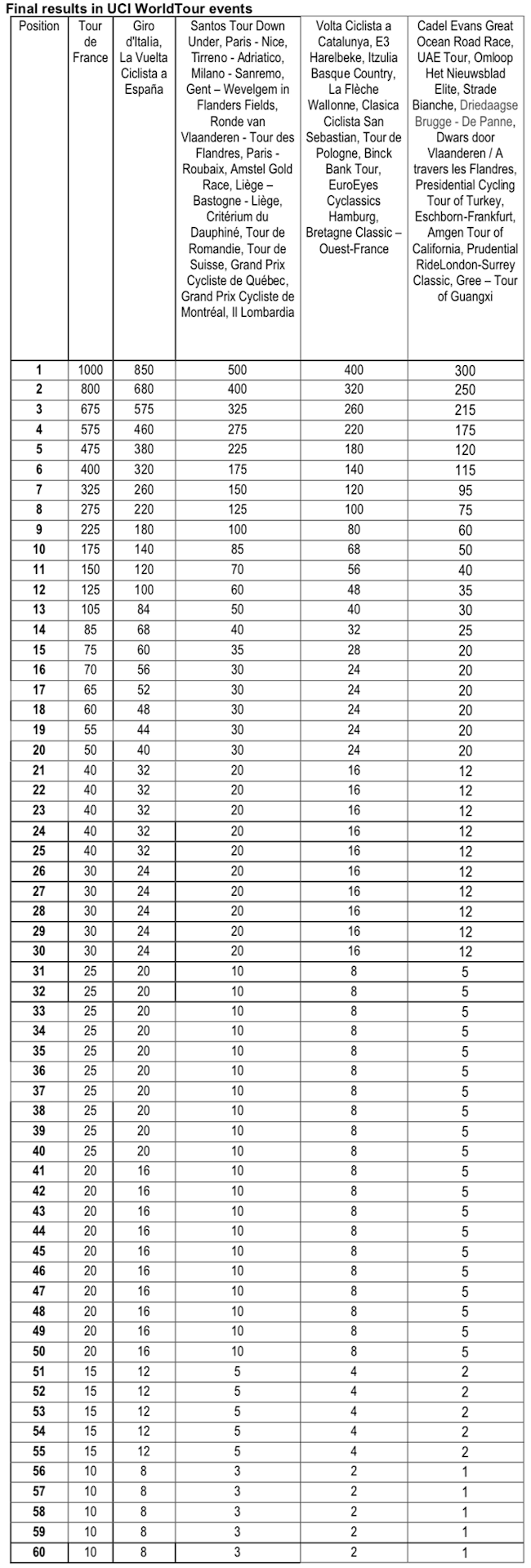
Next and you can see below how much winning a stage is worth in points terms, again the same categories of races apply. As you can see, the Tour de France commands a premium and a stage win in a grand tour is deemed equivalent to 12th place meaning it can be worth trying to win a stage but a tenth place overall is quietly more valuable. Similarly Porte winning the overall in the Tour Down Under is worth more all his stage wins on Willunga and by some way.
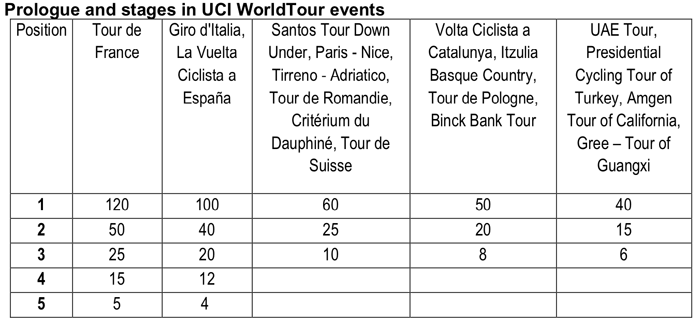
Next up there are points for winning a jersey outright in the grand tours as you can below, it’s worth the same as winning one stage along the way too. It’s only for the grand tours so winning the mountains jersey in the Dauphiné is literally pointless and the white jersey competitions and other varieties are excluded.

There are also points on offer for wearing a jersey each day too, here’s the breakdown below.

Next comes the points on offer from winning events outside the World Tour, so win a one day Pro Series race, the new label for HC races, like the Giro dell’Emilia and it’s the same as winning the overall for an Pro Series stage race like the Tour de Yorkshire and so on, and then fewer points down the Under-23 “U” races with the Tour de l’Avenir as the prime event and U23 Nations Cup races getting a premium too. Also below this table are the points on offer for stage wins and the table for wearing a jersey.
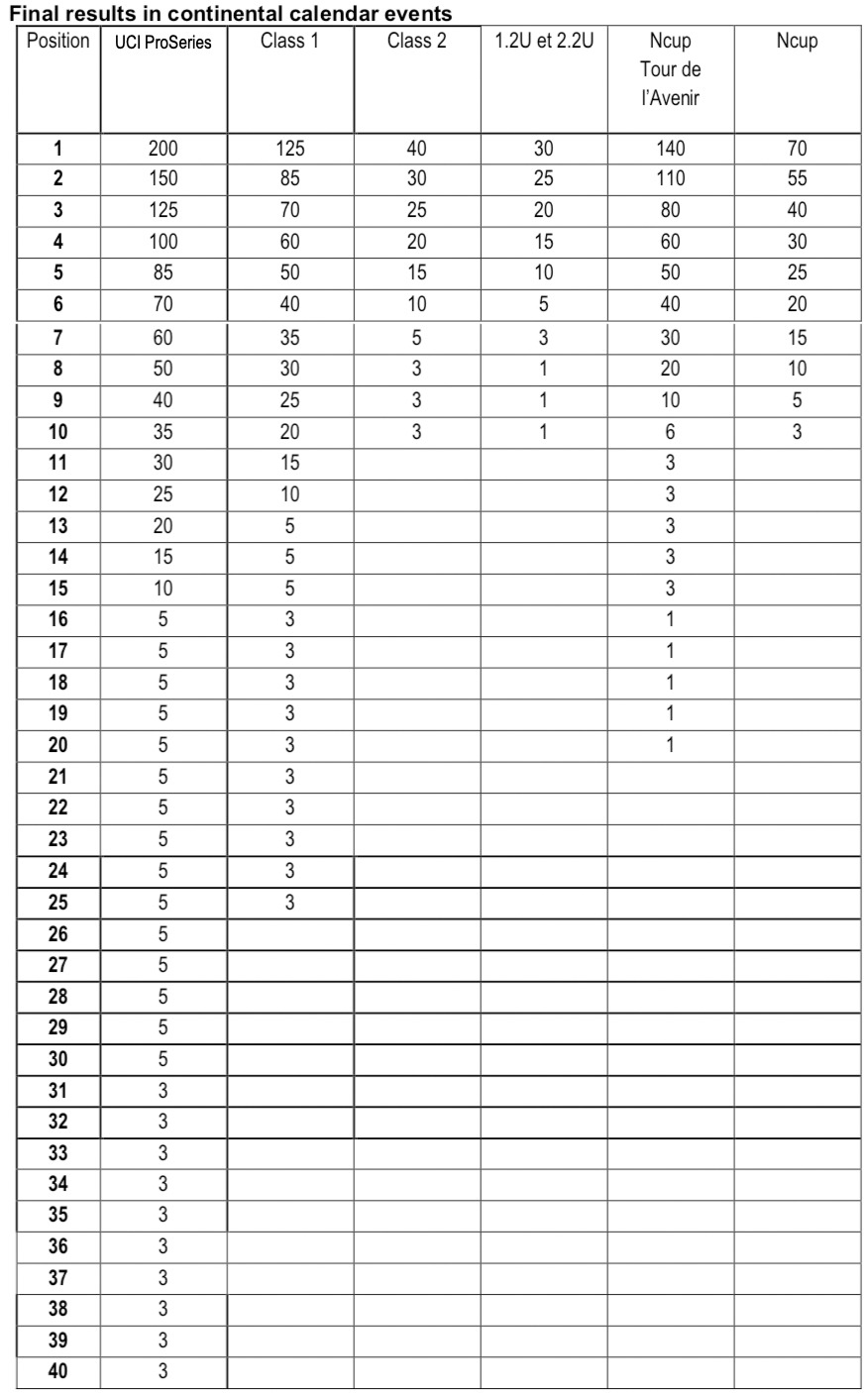


Next up is the table for the Continental Championships, for example the European Championships won by Elia Viviani. It’s not just a title and a distinctive jersey but there’s 250 points for the winner – double winning a Tour stage – which makes it valuable, enough to attract riders to take part but also as these continental confederations are part of the UCI’s structure, a way to ensure the UCI’s own events are valued too. And if there’s a team time trial then you can see the added table below too.
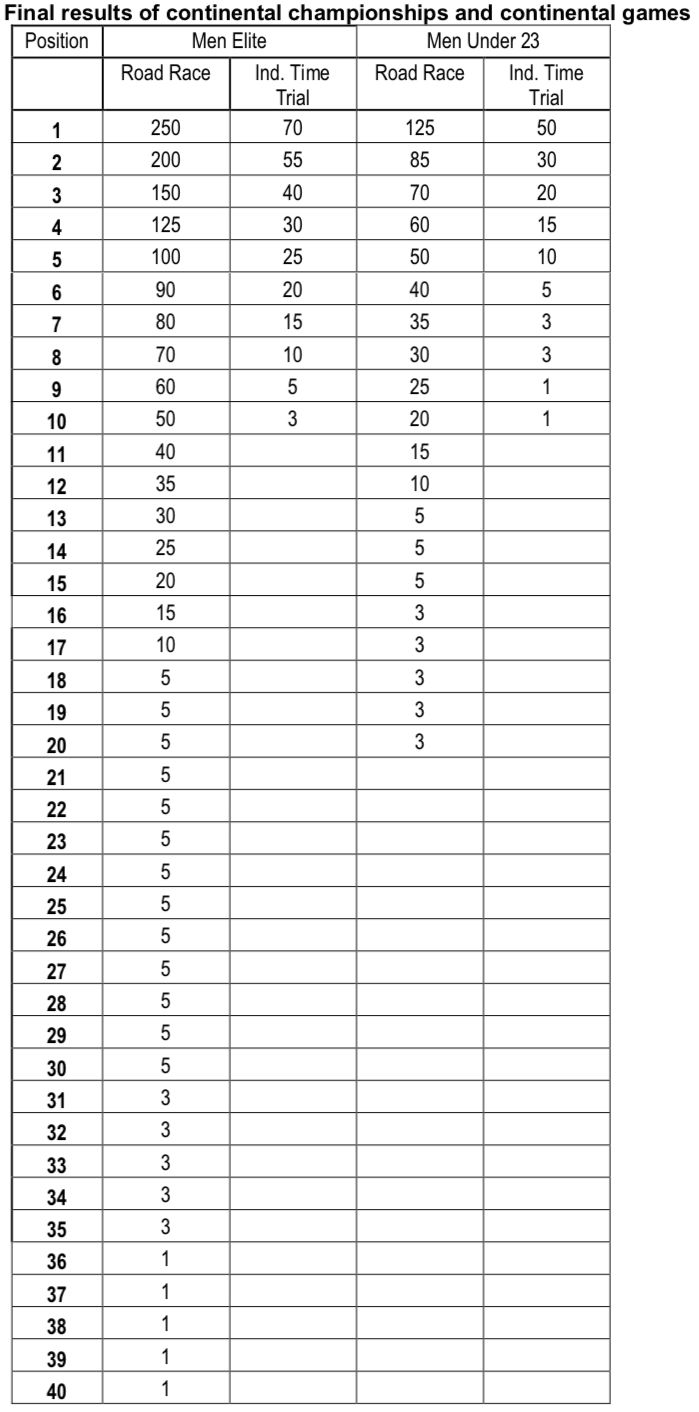
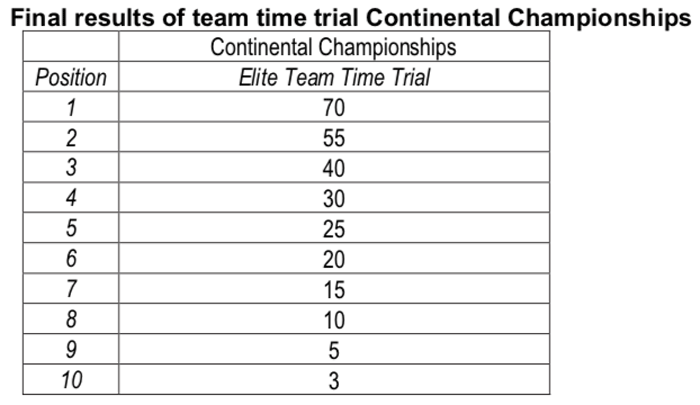
If the continental championships are related to the UCI’s structure, below is the table for the World Championships which is an event owned by the UCI, plus the Olympics on the road too. As you can see, the road race is valued at almost twice that of the time trial and with 600 points on offer the road worlds is the single most lucrative one day race on the calendar, a full 100 points than a Monument classic.
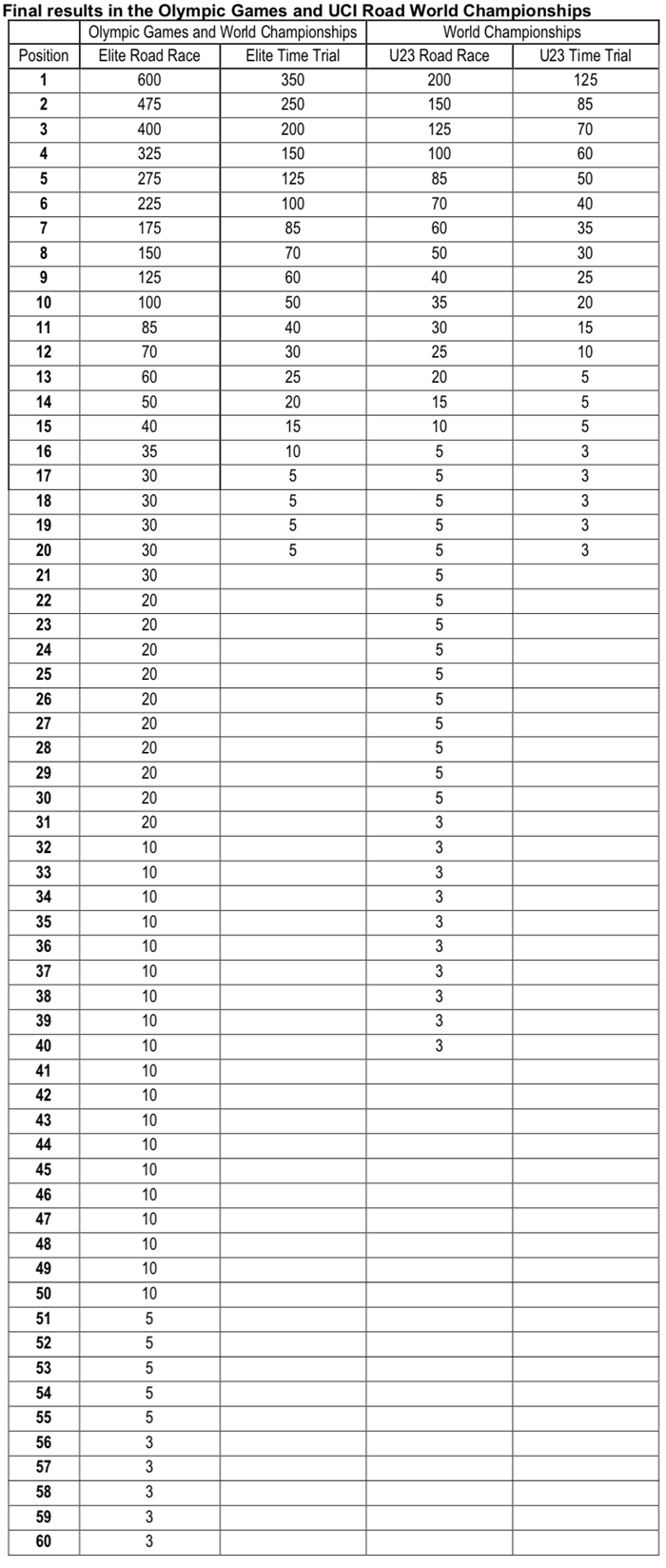
Lastly comes the new mixed relay time trial at the worlds. This event has replaced the pro team time trial with a relay race ridden by a team of women and a team of men from each country and the winners get 300 points each.
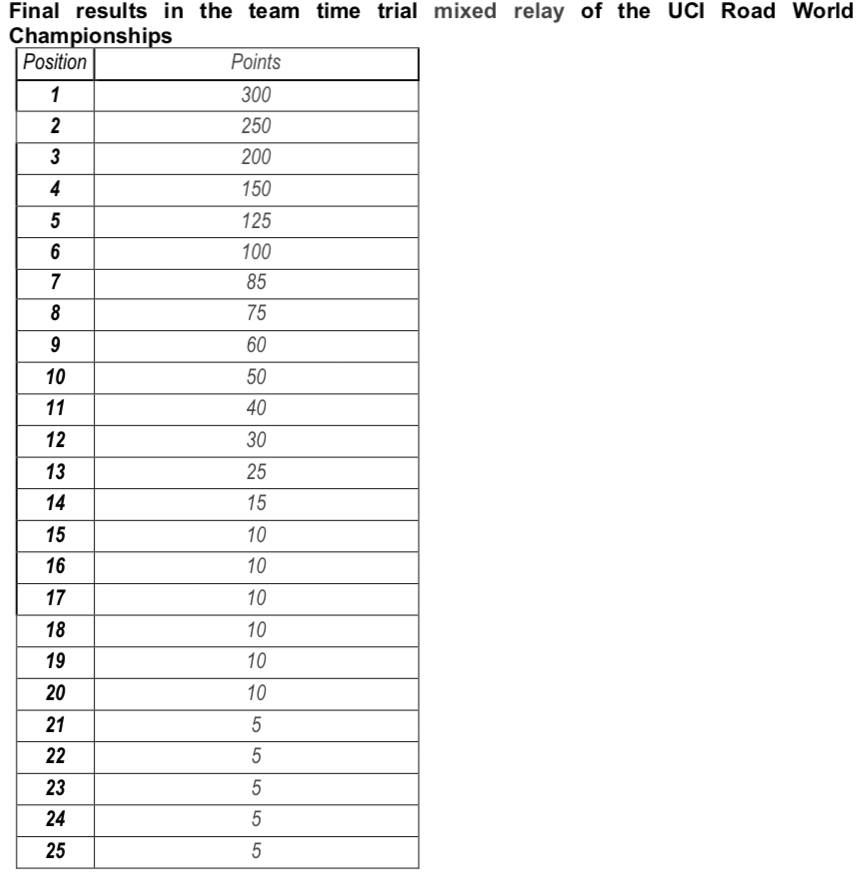
The value: You may not care too much for the rankings, you may question the relative importance attributed to different races but the UCI ranks teams and it matters. Last year Total Direct Energie won the right to start all the World Tour races they want by finishing as the top second tier team and Circus-Wanty Gobert have made this a goal for the year. It’s also an issue for the World Tour teams as if they don’t score enough points they can see their licence under review.
Conclusion
The rankings maybe near meaningless to fans – perhaps they’re meant to be, you need to root around on the UCI website, find the right PDF, scroll to the right chapter – but they matter to the riders, team managers and agents. For fans, the media and others there’s an implicit ranking of races based on prestige, history and other more subtle factors and arguably these count for a lot more… but all the tables are listed above so if you want to look them up for reference during the season here they are.

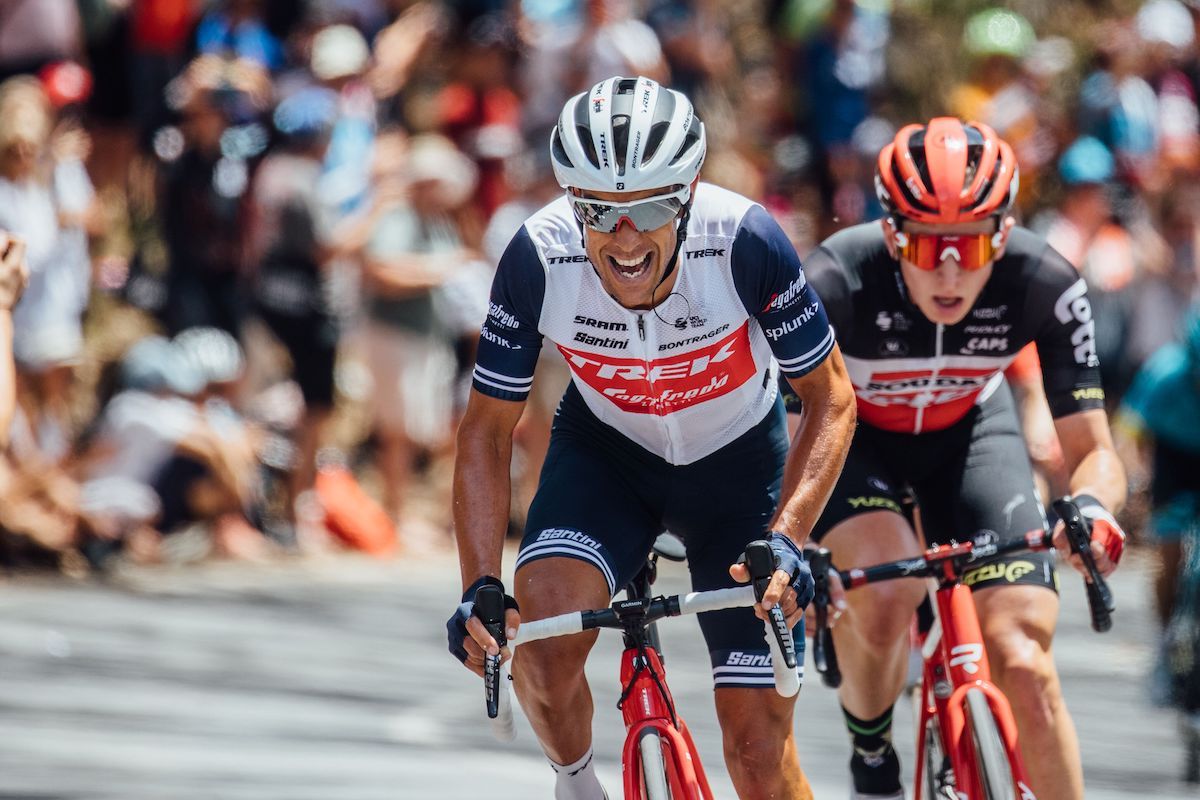
A point on methodology rather than principle. The PCS site, widely used by readers of this site I assume, also has a parallel PCS points ranking, interestingly extended to former riders and thus enabling a comparison, for example, between Peter Sagan et Alfredo Binda (Alfredo narrowly ahead for the moment). Maybe, if the UCI site could match the PCS site for ease of use, the PCS points system would become redundant. Do any site participants know the reason for this second ranking system which scores races and placings in similar proportion?
If the UCI site was more user-friendly it could help – half the point of this blog post is so I can have the tables for the rankings on one page to download – but I still think ranking cyclists says more about the rankings than it tells us about cyclists, ie it tells us a UCI committee rates the GP Québec as equal to Paris-Roubaix etc but doesn’t tell us much about the cyclists, eg today Jasper Stuyven and Steven Kruijswijk are rated as equal riders each on 1230 points but who would compare them?
I wonder though, is the points system a way of the UCI wrestling some control back off ASO (say)?
Rank the events by how we perceive them, and not only do the other events suffer (eg the TDU is arguably better off for the raking points), but the UCI slowly increases its leverage over the “Classics” etc.
Only so long as ASO and RCS consent to leave that power in the UCI’s hands by having their races as part of the WorldTour structure.
They can threaten to withdraw their races from the WorldTour system and register them at Hors Classe level, where would no longer be subject to the rankings system and can choose who to invite to race.
ASO has a number of sponsors which benefit heavily from cycling continuing to have global exposure, so they are probably quite happy with the premium offered to the overseas WT races in Australia and Canada.
Is the PCS ranking not simply the PCS site owners’ view of which races are most valuable? Ditto the CQ rankings.
So if the UCI rankings happen to track closely to the PCS or CQ ones, that’s nice, but PCS and CQ are ultimately doing their own thing?
If you have the WT system I can understand the benefit of a points system to rank teams, and guarantee spots in the WT races, but they shouldn’t bother collating / publishing an individual rider ranking as it doesn’t mean anything to anyone. Who won last year? I’d guess Roglic but it added nothing to the sporting contest of any WT event so what’s the point?
Every time I see the points system it raises an eyebrow that coming third in the TDU is worth more points than winning Omloop or Strade Bianchi. I appreciate the TDU for what it is, but it seems a little out of kilter, especially in relation to Strade Bianchi which is now arguably pushing Amstel as the sixth most prestigious one day race (not including the Worlds).
Its not only races like the Canadian, and TDU that should be relegated from 500 to 300 points.
Amstel, GW, Romandie should be relegated from 500 to 400 points.
Pologne, Hamburg, Harlebreke, Bink-bank, Sebastian and Bretagne should be relegated from 400 to 300 points.
Move up Het Volk from 300 to 400 points. Its a significant race and like Lombardia closes the season when the leaves are faling, Het Volk anounces that spring is comming and the start of the season.
Additional thoughts from a radical conservative point of view:
Differentiate between Giro and Vuelta – the later is a much less contested GT and should not give 850 points. Reduce it to 750. (and before 95 the Vuelta was a warm up race for Giro and TDF) + Reduce the points given for stagewins in Giro and Vuelta.
500 points should really only be granted to the 5 monuments and Tour de Swiss so we need another category. Lets say 600 point for a monument and TDS.
Why specifically the Tour de Suisse? Can’t see how that’s a more prestigious stage race than the Dauphiné (usually a better field), for instance. Nor P-N, T-A, etc.
These are “thoughts from a radical conservative point of view”.
TdS for many years has been widely considered as the fourth Grand Tour or at least the most important of one week races.
TDS:
Was the most pristigious non-GT for +80 years.
The most contested non-GT
The longest non-GT.
Its older than Vuelta Espania and was never a ‘national’ race like the Vuela (or Amstel) – it was an important race from the beginning.
Present place on the calendar is new where everything is squized arround ASO’s races. The important stage race calender used to be: Vuelta, Giro, TDS & TDF.
TA and Paris-Nice are the first meaningfull stage races of the season (like Het Volk) before the Classics – and always has been. Dauphine is a training race and always has been.
Interesting, thanks.
Nowadays, TdS is very much a training race, a la the Dauphiné.
TdS lost all credits when they tailored it a race Cancellara could win. Tour of the Alps with no flat pieces and no TT is way more interesting than last 10 TdS combined.
“(like Het Volk)” +1
Just to stress a radical conservative point of view.
Regarding 3rd in TDU compared to winning Omloop or Strade, this highlights another problem with ranking systems in cycling. All of them over-reward places compared to wins in nearly all categories. This is taken to silly extremes in the careful separation of 6th from 10th and even 15th from 17th which is bean-counting gone mad.
This can be solved.
For a start, the team ranking should be calculated on the best position achieved by any of the team’s riders in each race/stage (except for the winner’s team, which could take the points for their two best riders) and not by adding together the team’s best individual rankings. This would discourage ‘riding for points’ as it would be impossible to calculate the points available by combining combinations of minor placings.
Then you can recalibrate the points scale so all races other than 1.2/2.2 are awarded some multiple of the following scale (i.e. multiply by 10/8/5/3 for the WT races according to the current table columns, 2 for ProSeries and 1 for Class 1)
1st place: 100
2nd: 60 (i.e. 60% of the winner’s points)
3rd: 45 (45%)
4th-10th: 35-32-30-28-26-24-22
11th-20th: 20-19-18-17-16-15-14-13-12-11
Finishers below 20th: 10 points
Stage result and points/KOM for grand tours: 20-10-5
Jersey rent per day: 10
Perfect article to publish following on from TdU musings. Thank you INRNG.
Agree with your ‘it is what is’ stance on this. Seems likely the UCI wishes it wasn’t starting from here. When it comes to devising any system, there’s always going to be other ideas. Makes you wonder what organisers do to work the room whenever these points tariffs are being set. It’s horrid to see your favourite races compared by being rated in this way, but it’s inevitable.
I have no opinion on points for one day versus multi day or grand tour. That’s such a subjective subject. Some may say a 1 day classic is worth more than a 7 day tour but others who prefer the tours may wonder why a one day race is worth more than a 7 day race. I don’t really care. Point system is the points system.
But of course all races of the same level should carry the same points. The same as in any sport.
Firstly this encourages the new events or lesser known events to keep developing not being relegated as second rate (the promoters need a return on investment) but encouraging the event to get as much attention and good level competitors as possible for that event.
But secondly lots of sports have certain events which are deemed more prestigious then others. But that’s all they are. They keep the same number of points. Monaco used to be the most prestigious F1 race but it carried the same number of points as all the other events.
Old events may eventually fall because of economics and if you never get new events you will end up with a very spartan calendar indeed. We have lost many races over the years and new events in new places have to be encouraged to keep the sport going. Note that the UCI cannot possibly supply unlimited $ to keep everyone’s fav races going.
+1
Not every sport ranks wins equally:
* Men’s tennis has 5 different levels for its main tour, from the Grand Slams down to the likes of the Adelaide international, and another 5 for its challenger tournaments,
*Endurance motor-racing gives more points for Le Mans 24 than the other races,
* Golf has a load of different levels, based on the strength of the field,
* other individual sports rank by prize money, which obviously varies quite a lot.
The main issue I find with the UCI system is that it tries to compare one day races, GCs and stages on the same scale. 3 different rankings would make sense to me.
The big problem with having a points system is that it encourages teams to ride for points. Ergo, a rider might be told by their team to ensure they get a top 5 placing (if, let’s say, they’re in a breakaway) rather than going all-out for a win. There are multiple scenarios where points could encourage negative racing.
This can happen especially with the smaller teams. You can see Wanty-Gobert try to place several riders in the top-10 of a sprint sometimes rather than have two riders leading out the fastest rider to try and win or more realistically get a podium place.
This is caused by the calculation of the team ranking being the sum of the team’s best 10 riders’ individual rankings over the course of the year.
A better method would be solved to having the team awarded the points won by their best placed rider in each race/stage – including those won by riders racing for a national team, to act as an incentive for teams to release riders to race in national colours.
Agreed – the worst part of this in my opinion is if you take a rider like Nairo Quintana for 2019. He didn’t win anything of note, and solely rode to some high placings in the stage races he did. However, his ranking is much higher than both Mads Petersen and Alberto Bettiol. Ridiculous. The ranking must be weighted towards winning.
Placings needs to be significantly lower than it is. I want to see the top 20 include riders who won the biggest races and then riders 21-300 can be filled with riders who placed in all the races. But their total points needs to be significantly lower than someone who won Flanders.
Eg. take a rider who came 8th in the Tour, which means some high placings on climbing stages and potentially 1 stage win. This same rider may have podiumed one shorter stage race and then had top-10 placings throughout the rest of the season to build for the Tour. In my opinion the maximum number of points that rider should be able to pull should be 800 or something. Then winning Worlds should be 1,100, a Monument 1,000, a Classic is 900. In this world, Nairo Quintana would be ranked below Bettiol and Pedersen.
What about the rider who won a stage in two Grand Tours and a stage in one short stage race? Should we rank him below a rider who won two one-day races, if one of them is a World Championship? And should we rank him below a rider who one one-day race, if it was a Monument?
I can see the point of ranking a one-day race, even if it’s “only” a Classic higher than a stage in a Grand Tour – but if we want the ranking to be more weighted towards winning, shouldn’t the victories add up? Or should we regard a victory in the Worlds or a Monument as a card that trumps all hands that lack a card of the same value?
Definitely. If you win 2 GT stages and 1 P-N stage, that value should be smaller than 1 Monument win – and it currently is this way.
Monuments, World Championships and the Yellow Jersey are the most important wins on the calendar. The points need to reflect that. Then comes Classics, then comes secondary stage races and semi-classics. Then, and a long way down are jersey holdings, placings (2nd-onwards), etc.
The rankings are calculated on a week-on-week basis though, so they’re meant to reward consistency and season-long endeavour not just performance on a given day.
Taking last season in its entirety, Quintana was far stronger than Pederson or Bettiol and his final ranking rightly reflects this in my view.
Ecky – interesting that you think Quintana was far stronger than Pedersen/Bettiol – but I disagree entirely. Bettiol’s Flanders was a great race, and he had a very strong season too. Pedersen’s Worlds win was a beastial ride too.
Overall Quintana had a solid season, but there weren’t any special results.
CA, the way I see it the season you call “very strong” had exactly three peaks: in March two podium stage finishes in Tirreno-Adriaco, in spring classics one victory and two top ten finishes, and in June., two podium finishes in the nationals. Not bad – and the victory was in a Monument, no one wants to diminish that achievement – but the rest: muddling through, resultwise, doing the work but nothing more.
Nairo Quintana scored victories in two different Grand Tours and top ten GC finishes in both and in three short WT stage races. Not what I’d call a very strong season, but I wouldn’t argue against someone calling it a strong season – even if I don’t think it was strong by Quintana’s standards.
Comparing Bettiol’s and Quintana’s seasons is not easy (or indeed any pairing of a non-GC and a GC rider) but there’s definitely more to it than letting the memory of one week colour the impression of the whole season:-)
For me, all this show is that we don’t need a points system, same as we don’t need a World Tour. Races stand alone: there’s no need to create some supposed ‘league’ that groups certain events together, nor a points system within that. Let the races be separate, as they always have been, and let the race organisers decide which teams ride.
Counterargument: lack of certainty regarding team standing and invitations to races provokes uncertainty in a sport that relies on patrons sponsoring the team in lieu of your name on XXX event.
How much more likely are you to invest on a team that’s guaranteed to provide publicity for your brand on the Tour de France Vs. racing on Poland on the same days?
I don’t agree with the current rankings, but I do understand why we need a system to provide some level of assurance to teams that they’ll be able to present their pitch to investors/sponsors, as well as to plan ahead with your roster, training plans, etc. See what happens to the wildcard invitations to major races – this is a life and death decision for small/medium teams trying to attract investment.
The biggest opportunity for improvement would be in the access of second-division teams to major WT races.
Currently we have a system of 19 WorldTeams, 1 ProTeam which gets access to all WT races and 1 ProTeam which gets access to WT one day races.
I’d like to see this changed up to see a gradual reduction to 16 WorldTeams, with pre-allocated access to all WT tours for 3 ProTeams and WT one day races for 4 ProTeams. I’d also like to see a system of rolling WT licence renewal/promotion instead of them all coming up at once.
But instead of these positions automatically going to the top ProTeams from the previous year, there should be a ‘draft’ for the top 8 ProTeams to select the races they most want to attend so that a wider variety of ProTeams can get exposure at bigger races. This would create a more progressive path towards racing at the top level, in turn helping to make a more competitive second tier.
I was expecting to be horrified by the points catagorisation, but I am not scandalised in the slightest.
The UCI could wield the points as a means of encouraging attendance at certain races, and therefore promote cycling in particular regions. I expect that this is why the TDU gets 500 points. Pull those points away and the competition evaporates, and any cycling initiatives in that country become stale baguettes.
The UCI has a responsibility to its members and to have a global focus so I can appreciate the rankings. It’s clear though that the GTs take pride of place in the UCIs trophy cabinet. Perhaps the unfair aspect is that many Pro-conti teams miss out on these points bonanzas.
My only criticism is perhaps the biggest one day races (Paris Roubaix, MSR and ToF) could have equal footing to the TdF.
Going back to the TDU, the biggest issue appears that it is owned by the Government of South Australia, and perhaps Australia needs a Tour of Australia, to showcase much more of it’s riches (including Tazmania) which could give rise to a far more interesting parcours.
With a bit of time and a list of stages, i could probably name all the TDF stage winners from the last few editions. 120 points each.
The TDU ended 3 days ago, and I can’t remember who finished 8th, if I even ever saw it anywhere. That lucky rider gets 125 points.
Fair?
There IS a problem with points allocation, and it comes from what you’ve mentioned – it is used as leverage to promote races that lack the interest of WT teams, instead of reflecting the importance/popularity of established races.
That means that top WT teams can safely ignore them (sponsors don’t care since nobody takes them seriously) while the smaller WT / bigger Pro Conti teams need to send their best riders, change their fitness plans, etc. or risk being relegated/missing out on promotion.
And for what? The big superstars of the sport won’t be peaking for the TDU or the Tour of Guangxi, no matter how many points are on offer, so how do they plan to make the races popular? It doesn’t help promotion of cycling in non-EU countries, it merely inconveniences smaller teams and forces them to ride from January until late October, at the risk of making them less competitive for races that matter.
If the UCI decides to use points to determine promotion/relegation or wild cards for big races, points need to mean something.
I think the question is if you award based on popularity then you absolutely destroy the TDU. Fewer teams turn up. The best riders don’t ride and only die hard fans follow the event. Sponsorship dwindles and the event folds and then you have to find another race to fill the calendar, which under your scheme then has to earn its points quotient.
No, I think from this POV the UCI are right because it’s not the European Cycling Federation, it’s the Union Cycliste Internationale, and so does need to promote cycling elsewhere. I’d also understand if you made a case for a separate ECF, but that’s for a different day.
There is some merit in having an overall classification. A GC for the entire year, but you’d have to limit the number of days racing to stop injury and burn-out, and I wonder if both rider and fan fatigue would basically mean it becomes less meaningful than the World Champs jersey because it goes to Heimar Zubeldia, who has consistently placed, never attacked and ridden a lot of races, and so you’d need to caveat the award. Perhaps, the best points tally from the best 20 days of racing over the year. So it rewards real effort, and still allows riders to compete heavily throughout the season to win – rewarding TT riders, sprinters, climbers and puncheurs all the same (with the exception that there are less race days which suit TTers, climbers and puncheurs).
I think Lukyluk’s point that it’s the smaller teams and lesser riders who are inconvenienced/hampered by having to ride races such as the TDU is a very important one.
With this and teams riding for points, not wins, it seems the points system is more likely to have a negative overall effect than a positive one.
Smaller teams aren’t obliged to ride these races. But turning them down is not easy which I appreciate.
It’s probably not easy for anyone, big or small, which is why UCI incentivises the race with points. They don’t have financial clout to boost prize money or subsidise teams so they use the one tool at their disposal.
It’s the same reason the Tour of Oman takes place. I doubt the UCI wanted a race through a desert on a bike, but key financial/commercial reasons come into play.
Once upon a time road cycling was the preserve of the old European Western elites, few would argue that broadening its reach to the US, Colombia, Australia and elsewhere was a bad thing.
Smaller WT teams are obliged to ride WT races.
“Once upon a time road cycling was the preserve of the old European Western elites, few would argue that broadening its reach to the US, Colombia, Australia and elsewhere was a bad thing.”
No argument until you give the winner of one of these events (especially in January/February) the same points as a Monument winner. That’s what I’m arguing against.
You would have a point, Larry, if the purpose of the points system was a meaningful annual championship.
But it is not. It is a system designed to qualify teams for higher level races on the basis of their consistent investment in the sport instead of just showing up for a handful of big races. As such, the fly away WT races all have an added premium compared to the points they would deserve purely on sporting merit.
It is for the same reason that a very high amount of points is offered for the Road World Championships and the teams permitted to benefit from those points, to give an incentive for professional teams to release their riders to national teams and even consider it when structuring their season. In a more pure world, there wouldn’t need to be any ranking points on offer for the Road World Championships because winning the World Championship would be regarded as enough of a prize in the first place.
A similar situation exists in sports car racing. The 24 Hours of Le Mans is the equivalent of the Tour de France in pretty well every aspect, but to incentivise consistent investment in sports car racing the other 4-6 hour WEC races have 50% of the Le Mans points and 8 hour races have 75%, both far more than they would be worth if you compared the other WEC races to Le Mans in terms of sporting merit.
+1
I’d agree with that synopsis.
If we start from the basis of ‘it is what it is’, the rankings are designed to partly mimic a league.
In any league, a win is a win is a win. Some wins are harder-earned than others, but they attract the same number of points.
We can argue until the cows come home how to load certain victories / races but the point of a ranking is to measure performance over a given time not just at a certain time.
So if you place well in January and are still doing the business come September, absolutely the points awarded in Australia have a lot of merit.
My main criticism of the rankings is that, whilst they can reward through promotion / relegation, there is not enough credence given to the respective winners.
The top team and riders should get more formal recognition – a trophy or bands on a jersey perhaps.
Roglic was consistently superb last season and yet the rainbow bands for a one-off race are worn by a domestiique-as stands.
The problem with a Tour of Australia is that Australia is roughly the size of Europe. Even Sydney to Adelaide is a 14-hour journey by car, and that’s only the bottom-right corner. You could do it in different parts each time, but you’d have to miss out most of the country every year.
+1 (ish)
I was going to agree (changed my mind slightly having looked at a few examples!) – amongst a lot of comments, there’s a willing blindness to the idea that a small proportion of these points are in the interest of the development of cycling. As long as this is all above board and there’s no corruption involved in points allocation, this seems fine in moderation. As the first WT race of the season, TDU seems to be overexposed (both good and bad) – in the midst of the season, fewer people seem concerned about how many points, say, the EuroEyes Cyclassics is worth.
In terms of prestige, the big anomoly for me is Strade Bianche and the value of Grand Tour stage wins (in comparison to middling one day races). I was surprised to see Kristoff ahead of Sagan in the rankings (see below) – Kristoff got more points for winning Grosser Preis des Kantons Aargau than you get for winning a stage of the Tour. Similarly, Van Avermaet gets almost as many points for placing 1st and 3rd at Montreal and Quebec as Carapaz did for winning the Giro (Caparaz obviously got various additional day-to-day points in Italy).
The most curious example for me is that Caleb Ewan got more points for placing 2nd at both the EuroEyes Cyclassics Hamburg and the Cadel Evans Road Race than for all (5!) his 2019 Grand Tour stage wins combined. Should this be corrected or does it motivate riders to perform away from the biggest stages? I guess the risk is that a lack of consistency with the races the teams/riders truly care about means that the rankings begin to misrepresent who is truly the best – do you care more about your rider being 1st on the Champs Elysee (120 pt) or 2nd in the Cadel Evans race (250 pt)?
It’s about longevity and consistency, as a rider and a team?
Ewan, as a native, is virtually obliged to race in Australia in January.
Witness a tough CEGORR yesterday; any points gained there were hard-fought.
It’s hard to imagine the races in Australia being prominent without the WT tag.
Winning a One-Day-Race most often needs way more effort than winning a dull TdF stage, where they let a group go, hold them at 5 minutes, put some effort into the last 25km to catch them at 3km to go and bring your sprinter who hasn’t been seen for the last 6 hours to the finish to swing his legs for 5o0 meters and take a win.
Yes, there are Onedays with the same playbook, but way more with exciting racing than an average Grand Tour stage. Your mileage may vary, but I’m fine with less points for dull GT stages.
Ole- Brilliant -that’s a whole new metric to exploit! Points could be awarded according to the entertainment value and panache of each ride, and viewers award kudos points after each race.. The UCI holds a glittering Acadamy Awards ceremony for the most entertaining rider of the year.. My mind is reeling with excitement 😃🤣
If I were the king of pro cycling there would be something between the 850 points for the Giro and 500 for Ghent-Wevelgem, like the 5 Monuments at 700 or something, unless you want to lower the points awarded for G-W and the like to 400 or maybe less? I’ll stop there so nobody can accuse me of ranting 🙂
I thought you were the King of Pro Cycling?
What would you do for the minor placings (2nd-onwards)? I think they should be significantly less (a fraction) of the points for winning. See my point on Pedersen and Bettiol vs Quintana in 2019, above.
CA – Read my last sentence again. You’re welcome! 🙂
More the Jordan Schlansky of pro cycling 🙂
I don’t have too much beef with the points awarded. I wouldn’t give the Tour more than the Giro or the Vuelta or Amstel Gold the same as the monuments but I don’t have a problem with the TDU getting the same as Paris-Nice or Tour de Suisse as a warm up race is a warm up race whether its relatively new and in Australia or old and in Europe. My main problem is with the ‘World Tour’ in general and the lumping together of Grand Tours, 1 week stage races and 1 day races. To give a completely random example you can’t really compare Richie Porte with John Degenkolb. If I ousted Larry as the King of Cycling I would bring back the World Cup (odd points leaders jersey included) and have that as the 10 or 12 most important one day races (ideally just 10), with equal points for each race rather like Formula 1 if you like. Any more races than that and you get to a point where riders cant do them all and it gets pointless trying to compare someone who placed well in 15 races against someone who won 2 monuments. My World Cup would probably be Strade Biance, Milano-Sanremo, Gent-W, Flanders, Roubaix, Amstel, Liege, San Sebastian, Paris-Tours, Lombardia. Obviously races not in would lose out and be seen as less important but that’s life, someone has to miss out. You could put the none monuments on rotation if it made people feel better. Then I’d have a championship of stage races spread across the year, I’m not sure what I’d call that. Start with TDU , Colombia and the Arab races, through Paris-Nice, Tirrenno, various Spanish races, Dauphine, Suisse, maybe the Eneco or whatever its called and then finish with Britain or something in China if needed. The Grand Tours would be stand alone events, to be seen as a championship in themselves. You could have a separate World Ranking, like the tennis one or whatever, where every race is given an amount of points depending on whether its ‘World Tour’, HC, 1.1, 1.2, a stage or whatever and it just rolls on and one and say Van der Poel could be ‘World Number 1’ for an x amount of weeks or years in the same way that Federer or Woods were.
Now and then I wonder what was wrong with the old Super Prestige Pernod award? But I’m trying not to get wound up about “Heinie’s Folly” and all the other less-than-stellar ideas that have been shoved down pro cycling’s throat by those who seemingly want to set things up so they can increase their monetary income.
The Super Prestige Pernod would have had the same complaints, wouldn’t it? It’s just another selection of 21 arbitrarily scored races.
“Why is the 4 Days of Dunkirk worth more than LBL?”
“Why is Bordeaux-Paris the same as the Ronde?”
“Why are there no points for Tirrenno-Adriatico, or Strade Bianche?”
I don’t remember all the whining about the Super Prestige, it seemed pretty obvious the winner was deserving no matter how his points were gained – but of course that was long before social media, so the bitching and moaning might have been just as long and loud, but you didn’t read about it in the pages of Winning Magazine or Bicisport.
I bet there was whining about the Super Prestige, but not via the same medium of internet forums that serves as the prime format for whining these days.
The consistent interest in the WorldTour from race organisers and teams would suggest that not everyone is paying attention to the whining.
I can’t remember the full story, nor the year in question but one year apparently Greg LeMond raced Lombardia glued to Sean Kelly’s wheel in order to defend his lead in the Super Prestige series rather than win the race and it didn’t go down well in the media.
I found a snippet about the 1976 Super Prestige Pernod in an article on Cycling Tips. It’s interesting to see the various points weightings of races and to see how their relative importance has changed. There seems to only have been points awarded for overall GC results in stage races with stage wins and days in leaders jerseys getting no recognition.
1976 SPP 1st place points
Paris-Nice 55
Milan San Remo 60
Semana Catalana 40
Amstel Gold Race 40
Tour of Flanders 60
Paris-Roubaix 65
Fleche-Wallone 45
Liege-Bastogne-Liege 45
Tour of Spain 70
4 Days of Dunkirk 50
Tour of Romandie 40
Giro d’Italia 75
Bordeaux-Paris 60
Criterium du Dauphine 55
GP di Midi Libre 50
Tour de France 110
World Road Title 70
Paris-Brussels 50
Tours-Versailles 60
GP des Nations 65
Tour of Lombardy 60
The Ardennes races have definitely risen in prestige since 1976 and Paris-Tours (Tours-Versailles in 1976) has fallen. Also interesting was the GP des Nations time trial garnering greater points for the winner than Milan San Remo or any other classic other than Paris-Roubaix.
How the world of pro cycling has changed in 45 years.
Isn’t your last sentence exactly what we have now?
Yeah I think there is something like that at the moment. I just meant I’d have it in addition to the other things.
I’ve had another idea whilst on the turbo…. all stages races (I think) designate stages as mountainous, or flat or whatever. How about a sprinters award. All flat stages across the year could get given a certain amount of points say 25, 15, 10 for the top 3 in flat stages of GTs (separate to the points jersey competition), less for the bigger one week races, less again for HC events, less again for .1 and the maybe 3, 2 and 1 for .2 races. Then at the end of the year we don’t have to say ‘who was the best sprinter, Viviani or Groenewegen?’, one of them would get given a little trophy at an awards night in Dubai to prove it definitively.
Broadly speaking I would vote for this, though the key issue is really that you don’t have separate teams for one day Classics and three week races (which I know you know). I guess what we’re getting down to is that the WT really lacks consistency and is a great mess. Part of me thinks, like with football, having UEFA, CONCACAF and FIFA etc for cycling might set up a more lucrative and interesting approach.
UEFA dominates with the wealthiest leagues, but much of the best talent comes from elsewhere, and the competition is no less fierce. There are definitely problems with FIFA and soccer, but I’m merely suggesting that a federation approach could be instructive.
Time trials are an awesome test for those who are trying, but it seems to me they often unbalance stage races, ie have too much influence relative to the actual racing. I notice that the UCI weights time trial wins at the Olympics and the Worlds much less than the corresponding road race, and also that no distinction is made between tt and race stage wins in stage races. I don’t care about the points as such, but I do wonder if there’s a rationale for rating a TT win less than a race win.
I’ve always thought stage-races were designed to determine the best all around racer so tests against the clock are required just as much as racing up and downhill, on the flats and into the wind.
Endless arguments ensue as to the best balance of the stages but I’d never suggest doing away with ITT (or even TTT) though I WOULD like to see the rules changed to eliminate all the chrono-specific equipment used today.
The bike industry gets it’s collective chamois all-in-a-bunch at the very thought but in the end if it’s bike sales they’re after, how many disc wheels, wacky handlebars and chrono frames that look like they’ve been ironed flat with a steamroller do they really sell vs standard roadracing type bicycles anyway? A race-against-the-clock is gonna produce the same results either way, so why allow all this otherwise useless equipment to be used?
Egwetter gree about the equipment. If the rationale for TTs in stage races is to find the best all-round rider, the same should apply to the bike, and all the bits on it.
Yes, as ugly as I fear the results would be (everyone on “aero road” bikes?) limiting a rider to one make/model bike with replacements of the same type in the event of a crash, mechanical issue, etc.) would make things more fair as well as lower the costs of equipment and transport. But the industry has demonstrated little in the way of interest in actual sporting values, it’s just about selling more stuff so I’m not holding my breath for any change.
One approach to quantifying the relative worth of each event in the calendar is to base it on the aggregate rankings of the field of competitors it attracted has in (the) previous edition(s). After a few iterations this tends to produce a ranking that aligns well with subjective perceptions of the prestige of each event and objective valuations of the strength of the competition.
I think that would work well for a fan ranking as it incorporates some of the “who did you beat” aspect… but it’d be difficult for the UCI/team aspect, where managers want to target certain races, score a known amount which is the other purpose of the tables.
Yes. You’d be annoyed if your victory was demoted because one rider got injured or didn’t turn up. Not your fault they didn’t turn up, but penalised all the same
Except it wouldn’t. As I wrote above, the ranking of the present edition of an event is based on the previous edition(s) of the event, not the current edition; therefore the value of the current edition is known beforehand.
The strength of this system is that it has built-in feedback. The individual choices of one year can only improve the ranking of events for the following year, so that with a few iterations the rankings sort themselves out. By the way, this is not something I pulled out of the top of my head, it is used sucessfully in a least one sport.
Although you do run the risks that not everybody rides every race to win so potentially:
1. more specialist but prestigious races, such as Paris-Roubaix, end up with a lower ranking than other, more accessible “training” races; and
2. the “other 2” Grand Tours end up with lower rankings than that year’s favoured TdF warm-up race or Tirreno-Adriatico and Paris-Nice, which almost always have excellent fields, some of whom are just getting the miles in.
Perhaps it might work if you based it on the rankings of the top 10 only, so those using the race as a training ride don’t affect it?